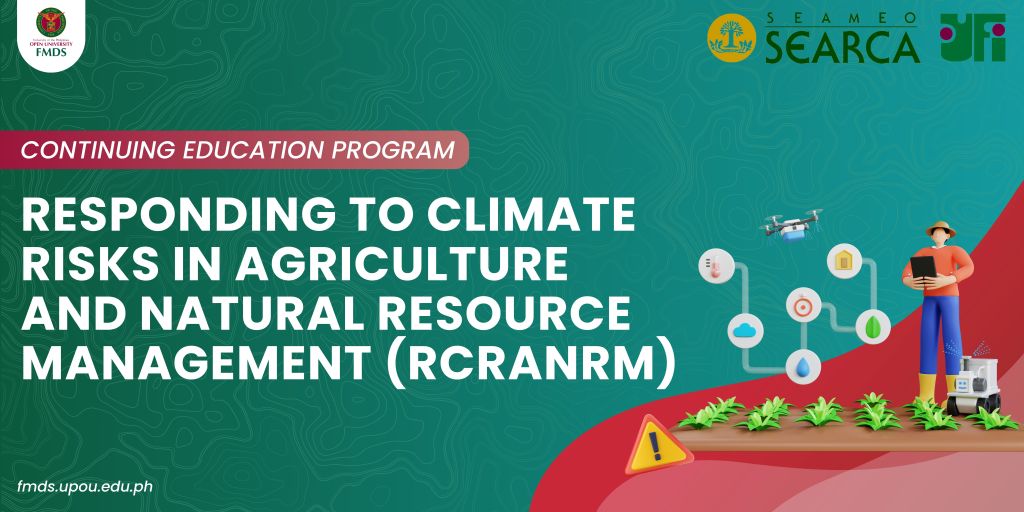
Background and Rationale
The non-formal and online course, Responding to Climate Risks in Agriculture and Natural Resource Management (RCRANRM) is a joint offering of the University of the Philippines Open University (UPOU) and Southeast Asian Regional Center for Graduate Study and Research in Agriculture (SEARCA).
This course has evolved from earlier offerings and aims to improve the capacity of professionals and organizations in agricultural and rural development amid the challenges of climate change. It has been developed to address the findings by UPOU and SEARCA in the conduct of similar courses. Particularly, they saw that: 1) there is a need to cover a vast number of topics in climate change adaptation and mitigation in the context of agriculture and environment in more learner-friendly and accessible formats; 2) there is a large population of professionals, graduate students, and environmental advocates/enthusiasts who are looking for learning opportunities (particularly in distance education format); and 3) these intended participants—who are or would likely be involved in adaptation and mitigation activities—have varied characteristics and interests.
Course Goals
Seeing the above-mentioned lessons as drivers, RCRANRM was developed and is continuously enhanced. The online course would enable participants to appreciate the core concepts, methods, and tools in climate change mitigation and adaptation particularly in the context of food security, agriculture, and natural resource management.
Specifically, the course serves as an introductory e-Learning course that aims to:
- provide an appreciation of climate change in the context of food security, agriculture, and natural resources management;
- provide a review of the core concepts and available knowledge-based methods and tools that are currently being used in agriculture and natural resource management vis-a-vis climate-related challenges; and
- enable learners to appreciate, differentiate, and apply tools/practices in climate-smart agriculture and sustainable agriculture.
Course Modules
The course covers five (5) modules.
Module 1. Preparing the Soil, Planting Seeds: The Science and Policy of Climate Change
As an introduction, this module discusses the science and policy of climate change. Learners shall walk through the basics of climate change and on global and national policy making. Looking at global efforts in policymaking as well as country-based examples, this module introduces, discusses, and analyzes policies related to climate action and adaptation.
Module 2. Rains and Grains – Climate Change and What it Means to Agriculture
This module contextualizes climate change in agriculture and natural resources management setting. This includes the concept of food security as among the pillars of sustainable development. This module also covers the basic concepts of climate change adaptation (CCA) and climate risk management (CRM).
Module 3: Planning and Adapting for Tomorrow– What Do We Need to Know
This module focuses on the important tools that can be used to inform climate change adaptation planning and provides an appreciation of its basic concepts and fundamental steps.
It will introduce methodologies such as vulnerability assessment and economic valuation of climate risks in agriculture and natural resource management. This provides an appreciation of the different economic tools that can be used to help decision makers determine the most cost effective adaptation options available to them.
Module 4. Changing Seasons, Reaping the Harvests: Sustainable Agriculture and Climate Change
This module focuses on the concepts and practices of climate-smart agriculture and sustainable agriculture, allowing the learners a deeper investigation of such interventions in the agriculture sector. In this module, learners are encouraged to ask questions such as, “Is there any difference between the two concepts and practices?” or “How can we situate such concepts to our realities?” By appreciating these core concepts and practices, the learners are invited to be critical, analytical, and imaginative, as they prepare for the next module.
Module 5. Towards a Food-Secure and Resilient Future: Final Project
This module requires learners to consider how they may apply their learnings to the design and development of programs in their own communities, LGUs, or workplaces. As they tackle this module and develop a paper, they are encouraged to keep a mindset that they are contributing to the realization of a more secure and sustainable future for everyone, especially if their paper will be submitted to authorities/organizations (and possibly, later adapted).
Course Schedule
| Week | No. of Weeks | Activity/Module |
| 1 | 1 | Course Orientation |
| 2-4 | 3 | Module 1 |
| 5-7 | 3 | Module 2 |
| 8-10 | 3 | Module 3 |
| 11-13 | 3 | Module 4 |
| 14-16 | 3 | Module 5, Submission of Final Project and Course Wrap-up/Integration |
| Awarding of Certificates (Physical presence is encouraged.) |
Enrollment
Interested participants may register online using the Online Sign-up form, or visit the Faculty of Management and Development Studies, UPOU HQ, Los Baños, Laguna. Details of course offering will be emailed a month before the start of class. (This includes the admission form with the assessment of fees and payment procedures.)
For inquiries, please email FMDS at fmds[email protected] or call us at (049) 536-6010.

















FMDS Socials